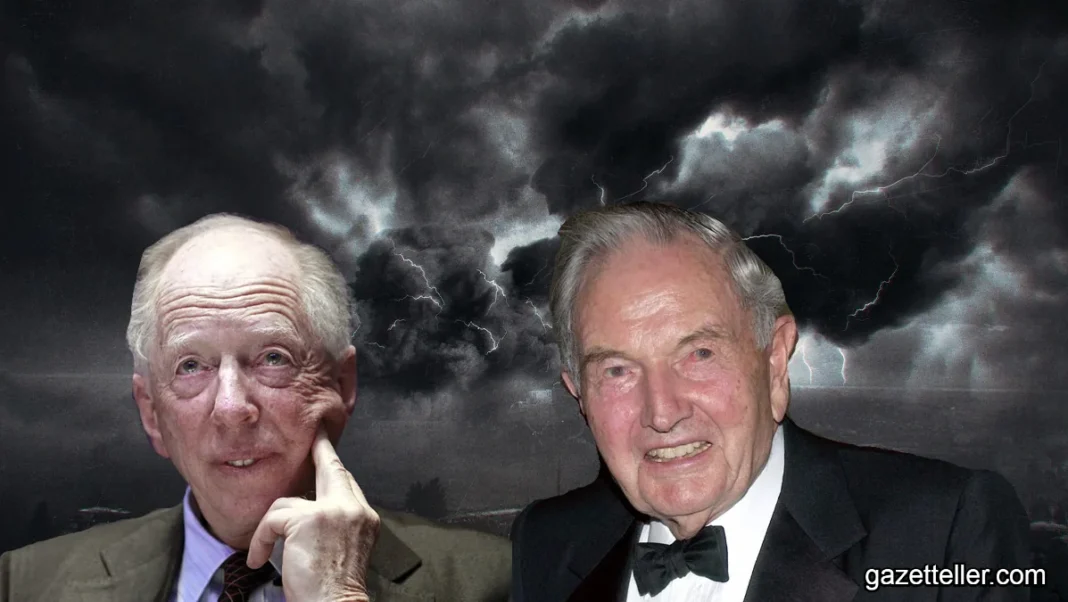In a world brimming with secrets, one dynasty’s name consistently rises above the rest, triggering heated debates, dark theories, and unparalleled intrigue. Enter the Rothschilds, a family whose alleged influence seems to permeate the fabric of global politics, finance, and even war.
A Web of Global Control
The vast majority – 99% of Earth’s inhabitants, to be precise – allegedly dance to the tunes of an elite 1%. A powerful, shadowy segment that most are unaware of. Yet, delve deeper, and we unearth a riveting claim: even this elite percentage is seemingly dominated by a single entity – the Rothschild lineage. The extent of their purported influence? A staggering $500 trillion.
But is there truth to these staggering claims?

The Banking Prowess
Here’s a compilation, not exhaustive, mind you, of banks, which according to various sources, are either owned or controlled by this family:
Afghanistan: Bank of Afghanistan
Albania: Bank of Albania
Algeria: Bank of Algeria
Argentina: Central Bank of Argentina
Armenia: Central Bank of Armenia
Aruba: Central Bank of Aruba
Australia: Reserve Bank of Australia
Austria: Austrian National Bank
Bahamas: Central Bank of The Bahamas
Bahrain: Central Bank of Bahrain
Bangladesh: Bangladesh Bank
Barbados: Central Bank of Barbados
Belarus: National Bank of the Republic of Belarus
Belgium: National Bank of Belgium
Belize: Central Bank of Belize
Benin: Central Bank of West African States (BCEAO)
Bermuda: Bermuda Monetary Authority
Bhutan: Royal Monetary Authority of Bhutan
Bolivia: Central Bank of Bolivia
Bosnia: Central Bank of Bosnia and Herzegovina
Botswana: Bank of Botswana
Brazil: Central Bank of Brazil
Bulgaria: Bulgarian National Bank
Burkina Faso: Central Bank of West African States (BCEAO)
Burundi: Bank of the Republic of Burundi
Cambodia: National Bank of Cambodia
Came Roon: Bank of Central African States
Canada: Bank of Canada – Banque du Canada
Cayman Islands: Cayman Islands Monetary Authority
Central African Republic: Bank of Central African States
Chad: Bank of Central African States
Chile: Central Bank of Chile
China: The People’s Bank of China
Colombia: Bank of the Republic
Comoros: Central Bank of Comoros
Congo: Bank of Central African States
Costa Rica: Central Bank of Costa Rica
Côte d’Ivoire: Central Bank of West African States (BCEAO)
Croatia: Croatian National Bank
Cuba: Central Bank of Cuba
Cyprus: Central Bank of Cyprus
Czech Republic: Czech National Bank
Denmark: National Bank of Denmark
Dominican Republic: Central Bank of the Dominican Republic
East Caribbean area: Eastern Caribbean Central Bank
Ecuador: Central Bank of Ecuador
Egypt: Central Bank of Egypt
El Salvador: Central Reserve Bank of El Salvador
Equatorial Guinea: Bank of Central African States
Estonia: Bank of Estonia
Ethiopia: National Bank of Ethiopia
European Union: European Central Bank
Fiji: Reserve Bank of Fiji
Finland: Bank of Finland
France: Bank of France
Gabon: Bank of Central African States
The Gambia: Central Bank of The Gambia
Georgia: National Bank of Georgia
Germany: Deutsche Bundesbank
Ghana: Bank of Ghana
Greece: Bank of Greece
Guatemala: Bank of Guatemala
Guinea Bissau: Central Bank of West African States (BCEAO)
Guyana: Bank of Guyana
Haiti: Central Bank of Haiti
Honduras: Central Bank of Honduras
Hong Kong: Hong Kong Monetary Authority
Hungary: Magyar Nemzeti Bank
Iceland: Central Bank of Iceland
India: Reserve Bank of India
Indonesia: Bank Indonesia
Iran: The Central Bank of the Islamic Republic of Iran
Iraq: Central Bank of Iraq
Ireland: Central Bank and Financial Services Authority of Ireland
Israel: Bank of Israel
Italy: Bank of Italy
Jamaica: Bank of Jamaica
Japan: Bank of Japan
Jordan: Central Bank of Jordan
Kazakhstan: National Bank of Kazakhstan
Kenya: Central Bank of Kenya
Korea: Bank of Korea
Kuwait: Central Bank of Kuwait
Kyrgyzstan: National Bank of the Kyrgyz Republic
Latvia: Bank of Latvia
Lebanon: Central Bank of Lebanon
Lesotho: Central Bank of Lesotho
Libya: Central Bank of Libya (Their most recent conquest)
Uruguay: Central Bank of Uruguay
Lithuania: Bank of Lithuania
Luxembourg: Central Bank of Luxembourg
Macao: Monetary Authority of Macao
Macedonia: National Bank of the Republic of Macedonia
Madagascar: Central Bank of Madagascar
Malawi: Reserve Bank of Malawi
Malaysia: Central Bank of Malaysia
Mali: Central Bank of West African States (BCEAO)
Malta: Central Bank of Malta
Mauritius: Bank of Mauritius
Mexico: Bank of Mexico
Moldova: National Bank of Moldova
Mongolia: Bank of Mongolia
Montenegro: Central Bank of Montenegro
Morocco: Bank of Morocco
Mozambique: Bank of Mozambique
Namibia: Bank of Namibia
Nepal: Central Bank of Nepal
Netherlands: Netherlands Bank
Netherlands Antilles: Bank of the Netherlands Antilles
New Zealand: Reserve Bank of New Zealand
Nicaragua: Central Bank of Nicaragua
Niger: Central Bank of West African States (BCEAO)
Nigeria: Central Bank of Nigeria
Norway: Central Bank of Norway
Oman: Central Bank of Oman
Pakistan: State Bank of Pakistan
Papua New Guinea: Bank of Papua New Guinea
Paraguay: Central Bank of Paraguay
Peru: Central Reserve Bank of Peru
Philip Pines: Bangko Sentral ng Pilipinas
Poland: National Bank of Poland
Portugal: Bank of Portugal
Qatar: Qatar Central Bank
Romania: National Bank of Romania
Rwanda: National Bank of Rwanda
San Marino: Central Bank of the Republic of San Marino
Samoa: Central Bank of Samoa
Saudi Arabia: Saudi Arabian Monetary Agency
Senegal: Central Bank of West African States (BCEAO)
Serbia: National Bank of Serbia
Seychelles: Central Bank of Seychelles
Sierra Leone: Bank of Sierra Leone
Singapore: Monetary Authority of Singapore
Slovakia: National Bank of Slovakia
Slovenia: Bank of Slovenia
Solomon Islands: Central Bank of Solomon Islands
South Africa: South African Reserve Bank
Spain: Bank of Spain
Sri Lanka: Central Bank of Sri Lanka
Sudan: Bank of Sudan
Surinam: Central Bank of Suriname
Swaziland: The Central Bank of Swaziland
Sweden: Sveriges Riksbank
Switzerland: Swiss National Bank
Tajikistan: National Bank of Tajikistan
Tanzania: Bank of Tanzania
Thailand: Bank of Thailand
Togo: Central Bank of West African States (BCEAO)
Tonga: National Reserve Bank of Tonga
Trinidad and Tobago: Central Bank of Trinidad and Tobago
Tunisia: Central Bank of Tunisia
Turkey: Central Bank of the Republic of Turkey
Uganda: Bank of Uganda
Ukraine: National Bank of Ukraine
United Arab Emirates: Central Bank of United Arab Emirates
United Kingdom: Bank of England
United States: Federal Reserve, Federal Reserve Bank of New York
Vanuatu: Reserve Bank of Vanuatu
Venezuela: Central Bank of Venezuela
Vietnam: The State Bank of Vietnam
Yemen: Central Bank of Yemen
Zambia: Bank of Zambia
Zimbabwe: Reserve Bank of Zimbabwe
Must See–> Deciphering a Decade of Darkness: How Military Intelligence Allegedly Uncovered the CCP’s Deep Infiltration into the Three Pillars of U.S. Governance.
The reach of the Rothschilds, it’s claimed, doesn’t end with banks. A peek into America’s financial system reveals more astonishing insights. A source named “Humansarefree” underscores that the US Federal Reserve, little known to many, isn’t a public institution. It’s private and is apparently exempt from US jurisdiction. If this doesn’t spark interest, maybe this will: This institution, allegedly under the influence of entities like the Rothschilds and the Rockefellers, is responsible for printing American currency.
Now, shift your attention to the Internal Revenue Service (IRS). Contrary to popular belief, it’s not strictly American. Claims assert it to be a foreign arm of the International Monetary Fund (IMF), serving the Federal Reserve’s interests. Its purpose? Ensuring the American public remains dutiful in their fiscal obligations.
Presidential Revelations
Recall 1835 when US President Andrew Jackson vehemently expressed his contempt for global financiers, alluding to a significant conspiracy? That sentiment escalated to an assassination attempt on his life, followed by a confession to his vice president about a bank’s intent to end him. A plot that seems to continue, as legends indicate both Lincoln and JFK met their untimely ends for their opposition to these banking giants.
Who REALLY Controls the US Money and Why Presidents Feared Them?

Megabanks: The World’s Financial Titans
Consider the two behemoths of global banking: the World Bank and the IMF. The former is co-owned by the world’s leading banking families, with the Rothschilds topping that list. The latter? Solely a Rothschild domain. These institutions have a reputation for lending to developing nations. However, skeptics argue that their loan structures ensnare these countries in debt, enabling the banks to seize their natural resources. Before offering these complex loans, it’s alleged that a significant portion is allocated to infrastructure, ensuring their companies can efficiently exploit these resources.
“Economic Hitmen” is a term coined to describe agents who negotiate these deals, either through attractive rewards or more sinister methods. Those keen on unraveling more of these tales might find “Confessions of an Economic Hitman” a captivating read.
Imminent Crisis in the USA: How It Will Affect You!
Wars, Empires, and Hidden Power
History enthusiasts might note that ever since the Napoleonic era, global wars had peculiar financing. The Rothschilds, some argue, discovered the profitability of funding both sides of conflicts. Such claims gain traction from Mayer Amschel’s wife, Guttle Schnapper, who once allegedly said that if her sons didn’t desire wars, none would ensue.
To many Americans, the realization that their nation is, in essence, a corporation controlled from overseas is shocking. The British Crown, distinct from the ceremonial monarchy, seemingly governs covertly from the sovereign state of The City of London. The Bank of England, sitting at this Crown’s helm, is, unsurprisingly, said to be Rothschild-controlled.
Nathan Mayer, in 1815, confidently remarked about controlling Britain’s financial fate, emphasizing the profound influence of controlling money.
The Rothschilds – are they truly the puppeteers orchestrating a New World Order, governing secret agencies, and wielding NATO as their private army? Or is it a web of conspiracy theories magnified by whispers and hearsays? The curtain of mystery remains. But one thing’s for sure; the name Rothschild continues to ignite imaginations, discussions, and debates around the globe.




